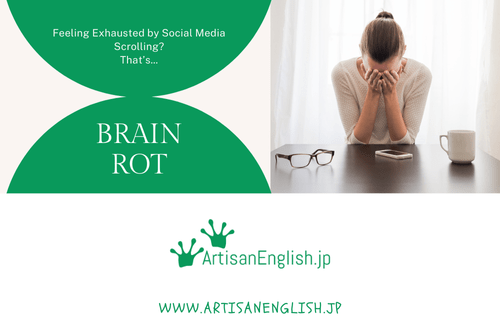
YouTube / iTunes / Spotify / Radio Public / Pocket Casts / Google Podcasts / Breaker / Overcast
Listen to ArtisanEnglish.jp posts & lesson intros here.
Word of the Day: Brain rot
Our technology addiction is causing many of us to feel overwhelmed by information, leading to what has recently come to be termed brain rot.
Quite simply, brain rot refers to a mental state where someone feels tired, confused, or unable to think clearly.
It often happens when we consume too much information or spend too much time on screens without breaks.
Back in the day, we used to call it brain fog.
You might experience brain rot after scrolling through social media for hours.
The endless stream of images and videos can overload your brain, making it hard to focus or think deeply.
This is because our minds can only absorb so much information before they start to feel “rotted.”
It’s like trying to cram too many books into a small bag—the bag (your brain) becomes overwhelmed.
Taking regular breaks from technology is essential to prevent brain rot from setting in.
If you’re feeling fuzzy-headed after studying or binge-watching shows, that’s a sign of brain rot.
Experts suggest engaging in activities that help reset your mind, such as walking, reading a book, or meditating.
These activities allow your brain to refresh and help prevent that sluggish feeling.
Additionally, consider limiting your screen time by incorporating a day or more of digital detox into your schedule.
While technology is beneficial, excessive use can lead to brain rot.
Instead of spending all your free time on your phone, try conversing with a friend or picking up an analogue hobby, like puzzles or games.
Flesch-Kincaid Readability Test
This post is understandable by someone with at least an 8th-grade education (age 13 – 14).
On the Flesch-Kincaid reading-ease test, this post scores 62.
The easier a passage is to read, the higher the score on a scale of 0 – 100.

